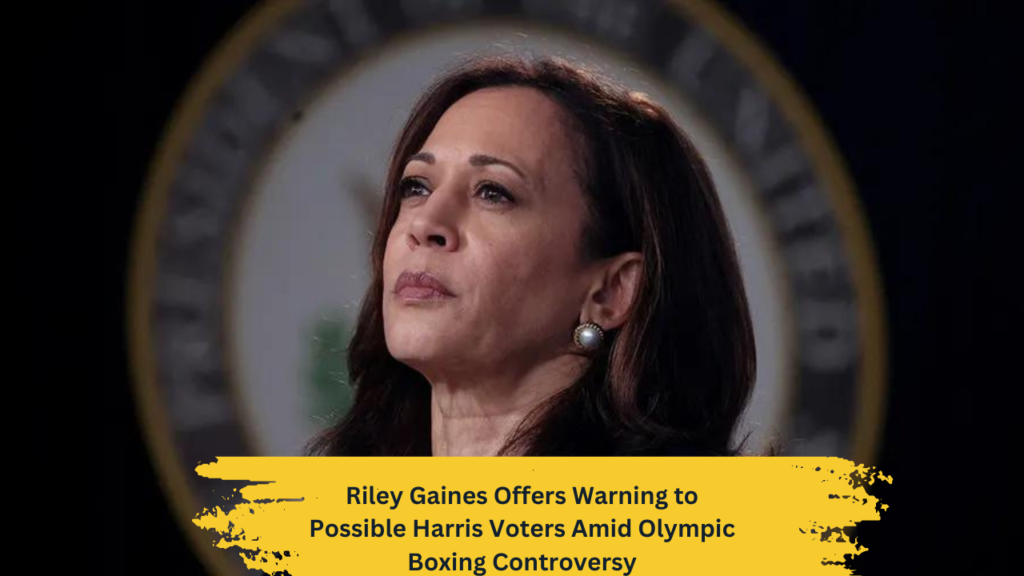Riley Gaines Offers Warning to Possible Harris Voters Amid Olympic Boxing Controversy
Riley Gaines, a renowned sports figure, has recently spoken out, issuing a stark warning to potential voters of Vice President Kamala Harris amid a growing controversy in Olympic boxing. As the debate over fairness and integrity in sports intensifies, Gaines’ comments have added fuel to the fire, urging citizens to consider the implications of their votes on the future of athletics.

Background: The Olympic Boxing Controversy
The controversy in Olympic boxing has been brewing for several years, centering on issues of fairness, officiating, and the inclusion of transgender athletes in women’s categories. Critics argue that the current rules do not adequately protect the integrity of female sports, leading to heated debates and divided opinions.
Fairness in Competition
At the heart of the controversy is the question of fairness. Critics, including Riley Gaines, argue that allowing transgender women to compete in women’s categories can create an uneven playing field, potentially disadvantaging cisgender female athletes. Proponents, on the other hand, emphasize the importance of inclusion and the rights of transgender athletes to compete in categories that align with their gender identity.
Officiating and Integrity
The integrity of officiating in Olympic boxing has also come under scrutiny. Accusations of biased judging and corruption have marred the sport, leading to calls for reform and greater transparency. These issues have sparked widespread concern about the credibility of Olympic boxing and the fairness of outcomes.
Riley Gaines: A Voice for Fairness in Sports
Riley Gaines, a decorated athlete and advocate for fair competition, has emerged as a prominent voice in the debate. Known for her achievements in the pool, Gaines has consistently spoken out on issues of integrity and fairness in sports. Her recent comments regarding Vice President Kamala Harris and the ongoing controversy in Olympic boxing have drawn significant attention.
Gaines’ Warning to Voters
Gaines’ warning to potential Harris voters revolves around the administration’s stance on transgender inclusion in sports. She urges voters to consider how policies favoring unrestricted inclusion might impact the future of women’s sports. Gaines emphasizes the importance of preserving fair competition and ensuring that all athletes have a level playing field.
Public Reaction
Gaines’ comments have sparked a range of reactions from the public and the sports community. Supporters applaud her for standing up for fairness and the integrity of women’s sports. Critics, however, argue that her stance may undermine efforts to promote inclusivity and equal rights for transgender athletes. The debate underscores the complexity of balancing fairness with inclusion in the world of sports.
Vice President Kamala Harris: Policies and Implications
Vice President Kamala Harris has been a vocal advocate for LGBTQ+ rights, supporting policies aimed at promoting inclusion and equality. Her administration’s stance on transgender inclusion in sports is a reflection of broader efforts to protect the rights of transgender individuals.
Policy Overview
The Harris administration supports the inclusion of transgender athletes in sports categories that align with their gender identity. This stance aligns with the principles of non-discrimination and equal opportunity, seeking to ensure that transgender athletes can participate fully in all aspects of life, including sports.
Implications for Sports
The implications of these policies for sports are significant. Proponents argue that they promote a more inclusive and accepting society, where athletes are judged based on their abilities rather than their gender identity. Critics, however, raise concerns about the potential for these policies to compromise the fairness of competition, particularly in women’s sports.
Balancing Fairness and Inclusion: The Path Forward
The debate over transgender inclusion in sports, exemplified by the Olympic boxing controversy and Riley Gaines’ comments, highlights the need for a nuanced approach that balances fairness and inclusion. Finding a path forward requires careful consideration of multiple factors, including the rights of transgender athletes, the integrity of competition, and the broader societal impacts of sports policies.
Dialogue and Collaboration
Open dialogue and collaboration between stakeholders, including athletes, policymakers, and advocacy groups, are essential for finding solutions that respect the rights and concerns of all parties involved. By working together, it is possible to develop policies that promote both fairness and inclusion, ensuring that sports remain a positive and unifying force in society.
Research and Evidence-Based Policies
Developing evidence-based policies is crucial for addressing the complex issues surrounding transgender inclusion in sports. Ongoing research into the physiological impacts of gender transition on athletic performance, as well as the social and psychological aspects of inclusion, can inform policies that are both fair and equitable.
Conclusion: The Importance of Informed Voting
Riley Gaines’ warning to potential Harris voters underscores the importance of informed voting and active engagement in the democratic process. As the debate over fairness and inclusion in sports continues, it is essential for citizens to consider the implications of policies on the future of athletics. By staying informed and participating in the dialogue, voters can help shape a sports landscape that reflects the values of fairness, integrity, and inclusion.
